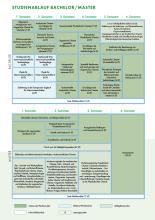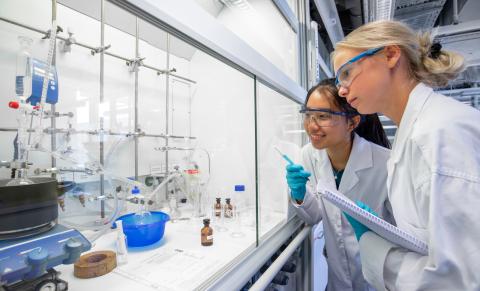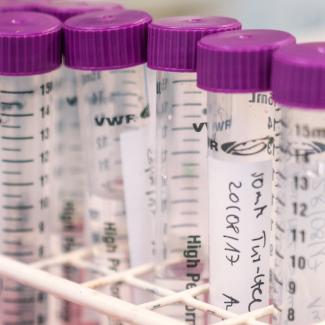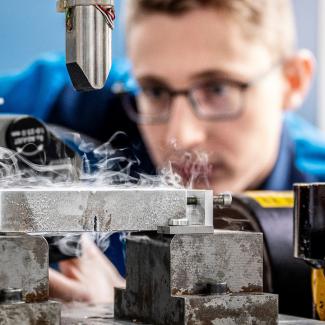Chemie
In the Master's in Chemistry, you will specialise in important areas of chemistry and build up your own profile by choosing the compulsory elective modules that appeal to you the most. These include modules that directly address current topics, such as "Bio-, Environmental and Materials Analysis", "Environmental Behaviour of Organic Pollutants", "Macromolecular Chemistry", "Semiconductor Chemistry", "Fundamentals of Natural Product Chemistry", "Silicon Chemistry", "Energy Conversion and Storage" or "Biotechnological Production Processes".
After an introductory project, you will complete a Master's thesis in the 4th semester. To do this, you will deal with an interesting research topic, find out about the subject, carry out experiments in the laboratory (or on the PC) and then present your results to the other members of the institute.
The courses at the TU Bergakademie Freiberg take place in comparatively small groups and practical problems are solved in teams. Online courses support individual learning. The proportion of laboratory practicals in the courses is very high at around 50 per cent. There is a very good supervision ratio and there are no waiting times for the laboratory practicals.
Please note that this is a German-language degree program. At TUBAF we offer a variety of English Master's degree programs. Click here for an overview.
- Faculty
-
Faculty of Chemistry, Physics and Bioscience (Faculty 2)
- Degree
-
Master of Science (M. Sc.)
- Standard period of study
-
4 Semester
- Part-time possible
-
Yes
- Start of studies
-
Winter semesterSummer semester
- Admission requirement
-
First professionally qualifying university degree in the Bachelor's degree programme in Chemistry from TUBAF or another university in the EU (incl. Great Britain, Norway and Switzerland) or at least an equivalent first professionally qualifying university degree with a standard period of study of at least 6 semesters (for detailed information, see study regulations). 6 semesters (for more detailed information, see the study regulations for the Master's degree programme in Chemistry)
Language requirement
- Application: with at least B1 level German
- Admission to the degree programme: with C1 level German (e.g. DSH-2)
- language courses and DSH exam at TUBAF
- Course language
-
German
- in the chemical industry: e.g. in research, production development and application technology, process engineering, management, chemical analysis, environmental protection, marketing, patents, public relations and communication
- in companies: e.g. in the pharmaceutical, cosmetics, food and agricultural industries, the automotive and transport sectors, the electrical, electronics and building materials industries as well as companies involved in energy and raw materials extraction and recycling
- at universities and research institutes: e.g. universities, Fraunhofer Institutes and Helmholtz Centres
- in the public sector: e.g. in federal, state and local authorities as well as trade supervisory offices and patent offices
- .e.g. universities, Fraunhofer Institutes and Helmholtz Centres
- in the public sector: e.g. in federal, state and local authorities as well as trade supervisory offices and patent offices
- as a freelance chemist
Why study chemistry at TUBAF?
Chemistry permeates everything. Every living being is a "chemical factory". Therefore, life is not possible without chemistry. Chemistry is therefore much more than just things that stink and bang. Chemistry will also contribute to less "stinking and banging" in the future, because only with chemistry can the great problems of mankind be solved. This requires a new generation of chemists who, for example, break new ground in sustainable chemistry, who rethink recycling, who develop efficient processes, new materials and catalysers in order to be able to live a life worth living in the future. The necessary training is available in Freiberg. Join us!
You can find more information in our chemistry blog!
Interests and skills you should bring along
If you are creative, interested in natural sciences, like to try out new things and want to know "what holds the world together at its core", then you have come to the right place!
Prerequisites for studying
A Bachelor's degree, particularly in chemistry but also in other related disciplines (such as applied natural sciences), forms the ideal basis for your Master's degree in chemistry.
Best results in the CHE university ranking
Many TUBAF chemistry students took part in the CHE university ranking survey. And the results are impressive: In comparison with other universities throughout Germany, our Chemistry degree programs (Bachelor and Diplom) achieved top places in all categories! You can find the detailed results here.
The detailed results of the CHE ranking were published in the ZEIT study guide and can also be viewed online (at www.heystudium.de/ranking after prior registration and internally via WISO). Here you can find the corresponding news release from TUBAF.

Indicator | Mean value for the TUBAF | Mean value for all universities |
| General study situation | 4,4 | 3,8 |
| Study organization | 4,8 | 4,4 |
| Support during studies | 4,4 | 3,8 |
| Laboratory practicals | 4,7 | 4,0 |
| Scientific competencies | 4,5 | 4,2 |
| Methodological skills | 4,5 | 4,1 |
| Interdisciplinary skills | 4,1 | 3,7 |
Why study chemistry at TUBAF?
Chemistry permeates everything. Every living being is a "chemical factory". Therefore, life is not possible without chemistry. Chemistry is therefore much more than just things that stink and bang. Chemistry will also contribute to less "stinking and banging" in the future, because only with chemistry can the great problems of mankind be solved. This requires a new generation of chemists who, for example, break new ground in sustainable chemistry, who rethink recycling, who develop efficient processes, new materials and catalysers in order to be able to live a life worth living in the future. The necessary training is available in Freiberg. Join us!
Interests and skills you should bring along
If you are creative, interested in natural sciences, like to try out new things and want to know "what holds the world together at its core", then you have come to the right place!
Prerequisites for studying
A Bachelor's degree, particularly in chemistry but also in other related disciplines (such as applied natural sciences), forms the ideal basis for your Master's degree in chemistry.
Current insights into studying can be found on the Instagram channel of the Faculty of Chemistry and Physics: @tubaf_nat










